

Making Islam Democratic: Social Movements and the Post-Islamist Turn - Asef Bayat. "Asef Bayat's Making Islam Democratic deserves the close attention of social scientists working at the intersection of religion, politics, and society.
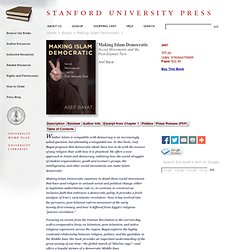
Bayat's central aim is to challenge the pervasive question of whether or not Islam is compatible with democracy. Through a rich comparative study of social movements in Egypt and Iran, Bayat persuasively argues that the persistent question of Islam and democracy is one that is fundamentally misguided . . . Bayat's rich empirical analysis is among the best of recent work on social movements in the region . . . Bayat's study therefore contributes to a growing body of literature concerned with the various trajectories of Islamist movements and parties throughout the region. While most political scientists examine how political institutions shape the likely political trajectories of Islamist parties, Bayat's focus on the social trajectory of these movements provides a rich addition to the literature. " Roy-23-3.pdf. How the West de-democratised the Middle East. Melbourne, Australia - With the momentous convulsion in the Middle East sparked by Mohamed Bouazizi's martyrdom in January 2011, it is time to ask what happened to the question which for long dominated Western discourse on the Middle East: Is Islam compatible with democracy?
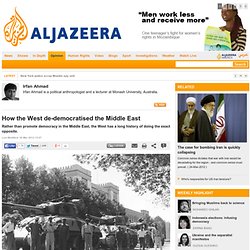
The predominant answer for many years was "no". Among others, Elie Kedourie, MS Lipset, and Huntington advocated such a position. Bernard Lewis, "the most influential postwar historian of Islam and the Middle East", who offered "the intellectual ammunition for the Iraq War", was most vociferous in upholding this position. Their main argument was that, unlike Christianity, Islam was unique in not differentiating religion from the state and hence democracy was impossible in Muslim polities.
Against this doxa, I make three arguments. Reason, Freedom, and Democracy in Islam: Abdolkarim Soroush. Essential Writings of Abdolkarim Soroush Edited and translated by Mahmoud Sadri, Edited and translated by Mahmoud Sadri, Ahmad Sadri, and Ahmad Sadri Reviews and Awards "This selection of [Khatami's] writings reveals a genuinely liberal intellect rooted in Soroush's Iranian and Islamic culture but at home with Western thought...his statements are penetrating and coherent.
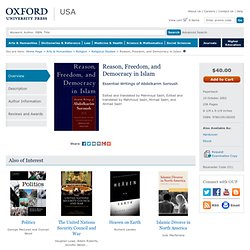
" --Foreign Affairs. Reason, Freedom, and Democracy in Islam. In 1979, Soroush became the youngest member appointed to Iran's post-revolution committee to purge and "Islamicize" Iran's universities.
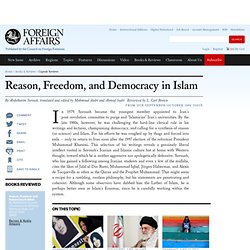
By the late 1980s, however, he was challenging the hard-line clerical rule in his writings and lectures, championing democracy, and calling for a synthesis of reason (or science) and Islam. For his efforts he was roughed up by thugs and forced into exile -- only to return to Iran soon after the 1997 election of the reformist President Muhammad Khatami. This selection of his writings reveals a genuinely liberal intellect rooted in Soroush's Iranian and Islamic culture but at home with Western thought, toward which he is neither aggressive nor apologetically defensive. Those who support democracy must welcome the rise of political Islam.
Islam and Democracy - what is the real question? Hefner, R.W., ed.: Remaking Muslim Politics: Pluralism, Contestation, Democratization. There is a struggle for the hearts and minds of Muslims unfolding across the Islamic world.
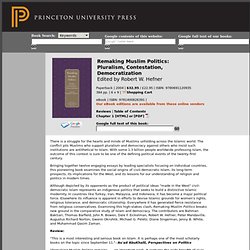
The conflict pits Muslims who support pluralism and democracy against others who insist such institutions are antithetical to Islam. With some 1.3 billion people worldwide professing Islam, the outcome of this contest is sure to be one of the defining political events of the twenty-first century. Bringing together twelve engaging essays by leading specialists focusing on individual countries, this pioneering book examines the social origins of civil-democratic Islam, its long-term prospects, its implications for the West, and its lessons for our understanding of religion and politics in modern times.
Although depicted by its opponents as the product of political ideas "made in the West" civil-democratic Islam represents an indigenous politics that seeks to build a distinctive Islamic modernity. In countries like Turkey, Iran, Malaysia, and Indonesia, it has become a major political force. Review: Robert Hefner » Anthropology. Robert Hefner see fieldwork photos Professor Office: 232 Bay State Road, #410 Office Phone: 617-353-2194 E-mail: rhefner@bu.edu Fall Office Hours: Tuesdays and Thursdays 1:00 – 3:00; and by appointment (Office hours are at Dr.
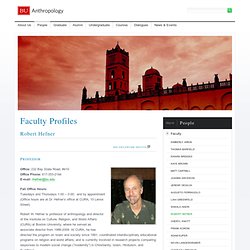
Robert W. Hefner has conducted research on Muslim culture, politics, and education since the mid-1980s, and on the comparative sociology/anthropology of world religions for the past thirty years. During 2009-2010, Hefner serves as the elected president of the Association for Asian Studies, the largest professional association for Asian studies in the world. View Professor Hefner’s CV Courses AN 101 Introduction to Cultural AnthropologyAN 319/719 Anthropology of Muslim Cultures and PoliticsAN 563 Public ReligionAN 318/718 Southeast Asia: Tradition and DevelopmentAN 704 Proseminar: Contemporary Anthropological Theory.
Making Islam Democratic: Social Movements and the Post-Islamist Turn - Asef Bayat. Democratic Ideology in Islamist Opposition? The Muslim Brotherhood's ‘Civil State’ - Middle Eastern Studies - Volume 45, Issue 2. Over the last two decades, the political ideology of the Egyptian Muslim Brotherhood has evolved to proactively advocate a democratic form of government.
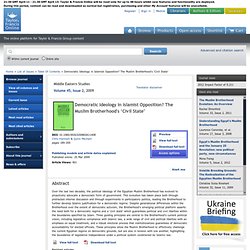
This evolution has taken place both through protracted internal discussion and through experiments in participatory politics, leading the Brotherhood to further develop Islamic justification for a democratic regime. Despite generational differences within the Brotherhood over the extent of democratic activism, the Brotherhood's emerging political platform asserts the need both for a democratic regime and a ‘civil state’ which guarantees political and civil liberties within the boundaries specified by Islam. Related articles View all related articles.